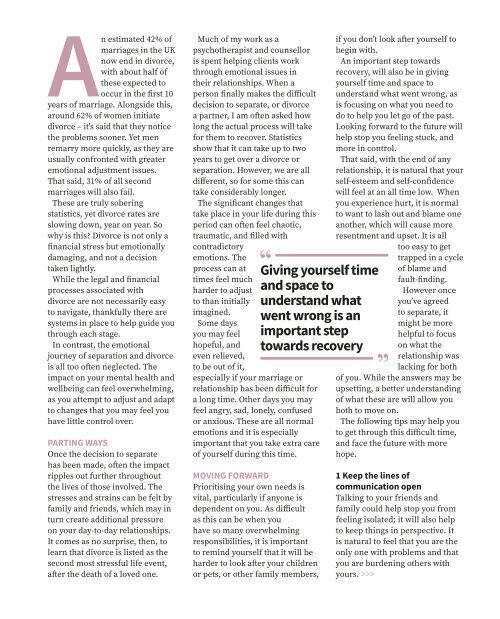Happiful August 2019
Create successful ePaper yourself
Turn your PDF publications into a flip-book with our unique Google optimized e-Paper software.
An estimated 42% of<br />
marriages in the UK<br />
now end in divorce,<br />
with about half of<br />
these expected to<br />
occur in the first 10<br />
years of marriage. Alongside this,<br />
around 62% of women initiate<br />
divorce – it's said that they notice<br />
the problems sooner. Yet men<br />
remarry more quickly, as they are<br />
usually confronted with greater<br />
emotional adjustment issues.<br />
That said, 31% of all second<br />
marriages will also fail.<br />
These are truly sobering<br />
statistics, yet divorce rates are<br />
slowing down, year on year. So<br />
why is this? Divorce is not only a<br />
financial stress but emotionally<br />
damaging, and not a decision<br />
taken lightly.<br />
While the legal and financial<br />
processes associated with<br />
divorce are not necessarily easy<br />
to navigate, thankfully there are<br />
systems in place to help guide you<br />
through each stage.<br />
In contrast, the emotional<br />
journey of separation and divorce<br />
is all too often neglected. The<br />
impact on your mental health and<br />
wellbeing can feel overwhelming,<br />
as you attempt to adjust and adapt<br />
to changes that you may feel you<br />
have little control over.<br />
PARTING WAYS<br />
Once the decision to separate<br />
has been made, often the impact<br />
ripples out further throughout<br />
the lives of those involved. The<br />
stresses and strains can be felt by<br />
family and friends, which may in<br />
turn create additional pressure<br />
on your day-to-day relationships.<br />
It comes as no surprise, then, to<br />
learn that divorce is listed as the<br />
second most stressful life event,<br />
after the death of a loved one.<br />
Much of my work as a<br />
psychotherapist and counsellor<br />
is spent helping clients work<br />
through emotional issues in<br />
their relationships. When a<br />
person finally makes the difficult<br />
decision to separate, or divorce<br />
a partner, I am often asked how<br />
long the actual process will take<br />
for them to recover. Statistics<br />
show that it can take up to two<br />
years to get over a divorce or<br />
separation. However, we are all<br />
different, so for some this can<br />
take considerably longer.<br />
The significant changes that<br />
take place in your life during this<br />
period can often feel chaotic,<br />
traumatic, and filled with<br />
contradictory<br />
emotions. The<br />
Giving yourself time<br />
and space to<br />
understand what<br />
went wrong is an<br />
important step<br />
towards recovery<br />
process can at<br />
times feel much<br />
harder to adjust<br />
to than initially<br />
imagined.<br />
Some days<br />
you may feel<br />
hopeful, and<br />
even relieved,<br />
to be out of it,<br />
especially if your marriage or<br />
relationship has been difficult for<br />
a long time. Other days you may<br />
feel angry, sad, lonely, confused<br />
or anxious. These are all normal<br />
emotions and it is especially<br />
important that you take extra care<br />
of yourself during this time.<br />
MOVING FORWARD<br />
Prioritising your own needs is<br />
vital, particularly if anyone is<br />
dependent on you. As difficult<br />
as this can be when you<br />
have so many overwhelming<br />
responsibilities, it is important<br />
to remind yourself that it will be<br />
harder to look after your children<br />
or pets, or other family members,<br />
if you don’t look after yourself to<br />
begin with.<br />
An important step towards<br />
recovery, will also be in giving<br />
yourself time and space to<br />
understand what went wrong, as<br />
is focusing on what you need to<br />
do to help you let go of the past.<br />
Looking forward to the future will<br />
help stop you feeling stuck, and<br />
more in control.<br />
That said, with the end of any<br />
relationship, it is natural that your<br />
self-esteem and self-confidence<br />
will feel at an all time low. When<br />
you experience hurt, it is normal<br />
to want to lash out and blame one<br />
another, which will cause more<br />
resentment and upset. It is all<br />
too easy to get<br />
trapped in a cycle<br />
of blame and<br />
fault-finding.<br />
However once<br />
you’ve agreed<br />
to separate, it<br />
might be more<br />
helpful to focus<br />
on what the<br />
relationship was<br />
lacking for both<br />
of you. While the answers may be<br />
upsetting, a better understanding<br />
of what these are will allow you<br />
both to move on.<br />
The following tips may help you<br />
to get through this difficult time,<br />
and face the future with more<br />
hope.<br />
1 Keep the lines of<br />
communication open<br />
Talking to your friends and<br />
family could help stop you from<br />
feeling isolated; it will also help<br />
to keep things in perspective. It<br />
is natural to feel that you are the<br />
only one with problems and that<br />
you are burdening others with<br />
yours. >>>

















